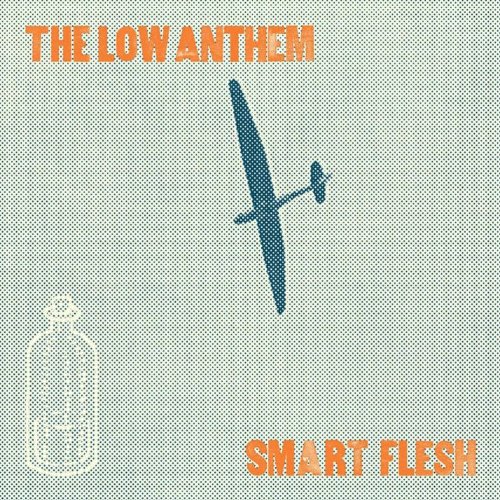In 2008, The Low Anthem, then Ben Knox Miller, Jeff Prystowsky, and Jocie Adams, took to a small but popular vacation spot called Block Island, located just off the coast of the band’s home state of Rhode Island. They did so, however, in the middle of winter, while Newport and Montauk’s sail boats were tucked away beneath their tarps and their families shoveled the often relentless northeast snow from their cars and homes for months on end. It was from this extremely isolated place that the group recorded the album that would ultimately announce their arrival, Oh My God, Charlie Darwin, a record that was as tightly-knit as the cabin that housed their small makeshift studio. As any of these three multi-instrumentalists would tell you, the space in which they chose to record OMGCD played a large part in shaping its overall sound, and such is the case with their recently released follow up, Smart Flesh.
This time around, the band took to an abandoned pasta sauce factory in the middle of Central Falls, RI- about ten minutes from Providence. This desolate building, which used to belong to Porino’s Gourmet Foods, is surrounded by other buildings that are equally as bleak and uninhabited, forming what looks like an untouched ghost town off of I-95. The Low Anthem, now a foursome after adding Brooklyn musician and old friend of the band Mat Davidson, spent months breaking in this overwhelming space to create what Ben had labeled a “little functioning society” within the second floor of a former testament to Rhode Island industry. In one corner was a “tennis” court, in another, a living room. In fact, the derelict pasta sauce factory that housed the band allowed them to invite friends and fellow artists of all mediums to pass through the building in order to take in its grand ambiance, possibly in hopes that they too would be as inspired to use its space to shape their art as they were. But of course, much of the space was dedicated to recording equipment and the various elderly instruments that the band trades back and forth during their live shows, each one of them seemingly with a long story embedded into it. After listening to this record, though, it’s clear that the most important instrument of them all was the factory itself.
Stylistically, this is quite a contrast from the closeness of OMGCD. All throughout Smart Flesh, you can hear the sounds bounce between the cold wood floor and the high-flying ceiling that mirrors it, wrapping around the steel support poles and ricocheting off of broken, mile-high windows. “Ghost Woman Blues,” originally written by classic blues artist George Carter, exemplifies this technique of catching the natural factory reverb perfectly. Here, a muted trumpet and Jocie’s classically-trained clarinet have a quiet conversation in between delicate harmonies by both Miller and Adams, all of which, with help from the factory, sound as if they were the only sounds on the planet– alone and with all the time in the world to spare. Such is the tempo and atmosphere of a majority of this LP, with near-dirges like “I’ll Take Out Your Ashes” and “Burn,” as well as traditionally storytelling fares like “Apothecary Love,” and plain old love songs such as “Matter of Time.” Ben’s sharp and extremely well-written lyrics are pointed at many different subjects, some of them quite specific, such as the Reagan-themed “Hey All You Hippies:” “Here comes Ronald Reagan from the Hollywood hills/It don’t look like he’s fooling around,” and the stomping 9/11 tribute “Boeing 737:” “I was in the air when the towers came down/In a bar on the 84th floor/I bought Philippe Petit a round/And asked what his high wire was for.” Petit’s death-defying stunt from 1974 clearly had an impact on the band, as it also gets another nod in the clarinet-infused classical piece “Wire.”
This is a good record, but I can’t help thinking that The Low Anthem are on the verge of something great. Their experimentations with sound on Smart Flesh give way for their timeless instrumentation to take flight and remain the protagonists without being sacrificed on account of a single message trying to be conveyed. They seem on the heels of taking their sound, seeped in the shadows of Waits and Cohen, into uninhabited territories only fit for themselves, and perhaps that is why this record feels as if it belongs more so to the setting in which it was recorded.

